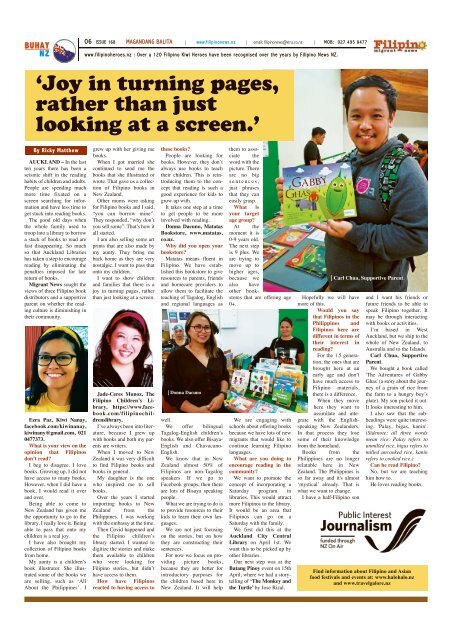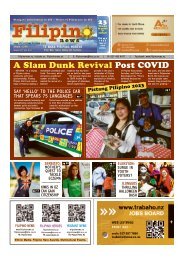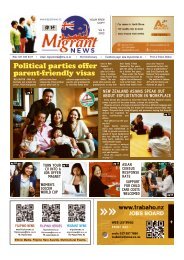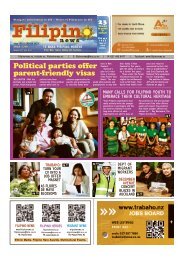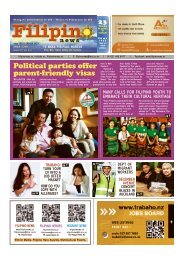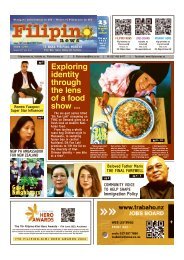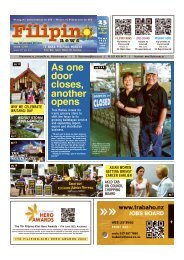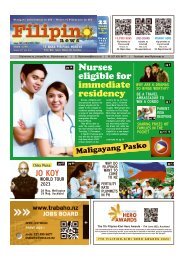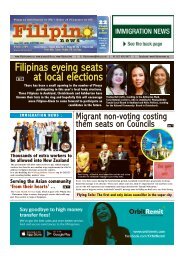Filipino News 168
www.filipinonews.nz New Zealand's only Filipino Community Newspaper for over 23 years! filipinonews@xtra.co.nz mobile: 027 495 8477
www.filipinonews.nz
New Zealand's only Filipino Community Newspaper for over 23 years!
filipinonews@xtra.co.nz
mobile: 027 495 8477
Create successful ePaper yourself
Turn your PDF publications into a flip-book with our unique Google optimized e-Paper software.
BUHAY<br />
NZ<br />
06 ISSUE <strong>168</strong> MAGANDANG BALITA | www.filipinonews.nz | email: filipinonews@xtra.co.nz | MOB: 027 495 8477<br />
www.filipinoheroes.nz : Over a 120 <strong>Filipino</strong> Kiwi Heroes have been recognised over the years by <strong>Filipino</strong> <strong>News</strong> NZ.<br />
‘Joy in turning pages,<br />
rather than just<br />
looking at a screen.’<br />
By Ricky Matthew<br />
AUCKLAND – In the last<br />
ten years there has been a<br />
seismic shift in the reading<br />
habits of children and adults.<br />
People are spending much<br />
more time fixated on a<br />
screen searching for information<br />
and have less time to<br />
get stuck into reading books.<br />
The good old days when<br />
the whole family used to<br />
troop into a library to borrow<br />
a stack of books to read are<br />
fast disappearing. So much<br />
so that Auckland Libraries<br />
has taken a step to encourage<br />
reading by eliminating the<br />
penalties imposed for late<br />
return of books.<br />
Migrant <strong>News</strong> sought the<br />
views of three <strong>Filipino</strong> book<br />
distributors and a supportive<br />
parent on whether the reading<br />
culture is diminishing in<br />
their community.<br />
Ezra Paz, Kiwi Nanay,<br />
facebook.com/kiwinanay,<br />
kiwinany@gmail.com, 021<br />
0477373.<br />
What is your view on the<br />
opinion that <strong>Filipino</strong>s<br />
don’t read?<br />
I beg to disagree. I love<br />
books. Growing up, I did not<br />
have access to many books.<br />
However, when I did have a<br />
book, I would read it over<br />
and over.<br />
Being able to come to<br />
New Zealand has given me<br />
the opportunity to go to the<br />
library. I really love it. Being<br />
able to pass that onto my<br />
children is a real joy.<br />
I have also brought my<br />
collection of <strong>Filipino</strong> books<br />
from home.<br />
My aunty is a children’s<br />
book illustrator. She illustrated<br />
some of the books we<br />
are selling, such as ‘All<br />
About the Philippines’. I<br />
grew up with her giving me<br />
books.<br />
When I got married she<br />
continued to send me the<br />
books that she illustrated or<br />
wrote. That gave us a collection<br />
of <strong>Filipino</strong> books in<br />
New Zealand.<br />
Other mums were asking<br />
for <strong>Filipino</strong> books and I said,<br />
“you can borrow mine”.<br />
They responded, “why don’t<br />
you sell some”. That’s how it<br />
all started.<br />
I am also selling some art<br />
prints that are also made by<br />
my aunty. They bring me<br />
back home as they are very<br />
nostalgic. I want to pass that<br />
onto my children.<br />
I want to show children<br />
and families that there is a<br />
joy in turning pages, rather<br />
than just looking at a screen.<br />
Jade-Ceres Munoz, The<br />
<strong>Filipino</strong> Children’s Library,<br />
https://www.facebook.com/filipinochildrenslibrary.<br />
I’ve always been into literature,<br />
because I grew up<br />
with books and both my parents<br />
are writers.<br />
When I moved to New<br />
Zealand it was very difficult<br />
to find <strong>Filipino</strong> books and<br />
books in general.<br />
My daughter is the one<br />
who inspired me to sell<br />
books.<br />
Over the years I started<br />
importing books to New<br />
Zealand from the<br />
Philippines. I was working<br />
with the embassy at the time.<br />
Then Covid happened and<br />
the <strong>Filipino</strong> children’s<br />
library started. I wanted to<br />
digitize the stories and make<br />
them available to children<br />
who were looking for<br />
<strong>Filipino</strong> stories, but didn’t<br />
have access to them.<br />
How have <strong>Filipino</strong>s<br />
reacted to having access to<br />
these books?<br />
People are looking for<br />
books. However, they don’t<br />
always use books to teach<br />
their children. This is reintroducing<br />
them to the concept<br />
that reading is such a<br />
good experience for kids to<br />
grow up with.<br />
It takes one step at a time<br />
to get people to be more<br />
involved with reading.<br />
Donna Dacuno, Matatas<br />
Bookstore, www.matatas.<br />
co.nz.<br />
Why did you open your<br />
bookstore?<br />
Matatas means fluent in<br />
<strong>Filipino</strong>. We have established<br />
this bookstore to give<br />
resources to parents, friends<br />
and homecare providers to<br />
allow them to facilitate the<br />
teaching of Tagalog, English<br />
and regional languages as<br />
|Donna Dacuno<br />
well.<br />
We offer bilingual<br />
Tagalog-English children’s<br />
books. We also offer Bisaya-<br />
English and Chavacano-<br />
English.<br />
We know that in New<br />
Zealand almost 50% of<br />
<strong>Filipino</strong>s are non-Tagalog<br />
speakers. If we go to<br />
Facebook groups, then there<br />
are lots of Bisaya speaking<br />
people.<br />
What we are trying to do is<br />
to provide resources to their<br />
kids to learn their own languages.<br />
We are not just focusing<br />
on the stories, but on how<br />
they are constructing their<br />
sentences.<br />
For now we focus on providing<br />
picture books,<br />
because they are better for<br />
introductory purposes for<br />
the children based here in<br />
New Zealand. It will help<br />
them to associate<br />
the<br />
word with the<br />
picture. There<br />
are no big<br />
sentences,<br />
just phrases<br />
that they can<br />
easily grasp.<br />
What is<br />
your target<br />
age group?<br />
At the<br />
moment it is<br />
0-9 years old.<br />
The next step<br />
is 9 plus. We<br />
are trying to<br />
move up to<br />
higher ages,<br />
because we<br />
also have<br />
other bookstores<br />
that are offering age<br />
0+.<br />
We are engaging with<br />
schools about offering books<br />
because we have lots of new<br />
migrants that would like to<br />
continue learning <strong>Filipino</strong><br />
languages.<br />
What are you doing to<br />
encourage reading in the<br />
community?<br />
We want to promote the<br />
concept of incorporating a<br />
Saturday program in<br />
libraries. This would attract<br />
more <strong>Filipino</strong>s to the library.<br />
It would be an area that<br />
<strong>Filipino</strong>s can go on a<br />
Saturday with the family.<br />
We first did this at the<br />
Auckland City Central<br />
Library on April 1st. We<br />
want this to be picked up by<br />
other libraries.<br />
Our next step was at the<br />
Batang Pinoy event on 15th<br />
April, where we had a storytelling<br />
of ‘The Monkey and<br />
the Turtle’ by Jose Rizal.<br />
Hopefully we will have<br />
more of this.<br />
Would you say<br />
that <strong>Filipino</strong>s in the<br />
Philippines and<br />
<strong>Filipino</strong>s here are<br />
different in terms of<br />
their interest in<br />
reading?<br />
For the 1.5 generation,<br />
the ones that are<br />
brought here at an<br />
early age and don’t<br />
have much access to<br />
<strong>Filipino</strong> materials,<br />
there is a difference.<br />
When they move<br />
here they want to<br />
assimilate and integrate<br />
with the Englishspeaking<br />
New Zealanders.<br />
In that process they lose<br />
some of their knowledge<br />
from the homeland.<br />
Books from the<br />
Philippines are no longer<br />
relatable here in New<br />
Zealand. The Philippines is<br />
so far away and it's almost<br />
‘mystical’ already. That is<br />
what we want to change.<br />
I have a half-<strong>Filipino</strong> son<br />
|Carl Chua, Supportive Parent.<br />
and I want his friends or<br />
future friends to be able to<br />
speak <strong>Filipino</strong> together. It<br />
may be through interacting<br />
with books or activities.<br />
I’m based in West<br />
Auckland, but we ship to the<br />
whole of New Zealand, to<br />
Australia and to the Islands.<br />
Carl Chua, Supportive<br />
Parent.<br />
We bought a book called<br />
'The Adventures of Gabby<br />
Ghas' (a story about the journey<br />
of a grain of rice from<br />
the farm to a hungry boy’s<br />
plate). My son picked it out.<br />
It looks interesting to him.<br />
I also saw that the subheadings<br />
were quite interesting.<br />
'Palay, bigas, kanin'.<br />
(Sidenote: all three words<br />
mean rice. Palay refers to<br />
unmilled rice, bigas refers to<br />
milled uncooked rice, kanin<br />
refers to cooked rice.)<br />
Can he read <strong>Filipino</strong>?<br />
No, but we are teaching<br />
him how to.<br />
He loves reading books.<br />
Find information about <strong>Filipino</strong> and Asian<br />
food festivals and events at: www.halohalo.nz<br />
and www.travelgalore.nz


